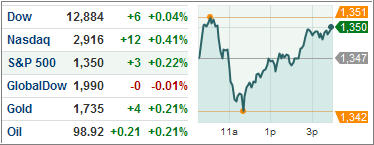Markets moved forward once again as the S&P 500 rose 0.22%. Nevertheless, European markets erred to the downside. While it seems like markets have discounted the Greek situation, there’s no promise that market price stability will persist.
Overall, there wasn’t much volatility across U.S. indices, currencies, Treasuries, or commodities today. The VIX went up over 2%, but this pales in comparison to the major price swings we witnessed in late 2011.
Meanwhile, an emergency meeting will be held among European finance ministers to discuss Greece. Greek PM Papademos finally met with party leaders today after delays to try and iron out a resolution. Whether Greece can institute fiscal reforms such as a 20% minimum wage cut remains the big unknown. Ultimately, a 50%-70% haircut on current bonds with the promise of new bonds is no cure for Greece’s financial irresponsibility. Renewed fiscal discipline must come from within the political coffers.
To get an idea of the difficulties faced among the PIIGS, take a look at this graphic. Greece, Portugal, Italy, and Ireland all have a debt-to-GDP ratio greater than 100%, underlying an unsettling truth that will make the possibility of full recovery a far off reality. Not to mention, France’s debt-to-GDP is supposed to increase to 89%, indicating that all is not well in the European core.
Even Germany is having its fair share of economic troubles. While its bonds haven’t skyrocketed like the PIIGS, the real economy picture shows frailty. For instance, industrial production and export orders fell in December. If weakness exists in Germany, this is a bad sign for the rest of Europe.
In an interesting twist, European investors are starting to have some faith in European corporate debt as a result of the ECB LTRO plan that has flooded banks with cheap money. However, I am bearish on European debt, both public and private. The ECB actions are a mere bandage – albeit necessary – not a long-term solution.
Back on home soil, there is now a possibility of another U.S. downgrade from Standard and Poor’s. Continued political strife over how to cut $1 trillion plus deficit is the main driver of a potential downgrade.
Despite the fact that continued market appreciation may not make much sense intellectually, it’s something we have to take into account. Thus, I have eased into equity/sector/country ETF positions since early January to participate in the upside while being prepared to use my exit strategy in case of any sudden trend reversal.
Contact Ulli

Comments 1
when you have a terrible stomach ache stop taking pepto bismo and stick your finger down your throat – maybe that’s the thing the markets should do